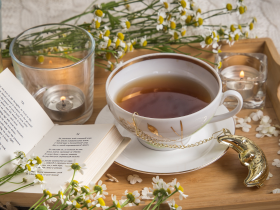Don’t have time to read the whole thing? Here are the bits you need to know:
- Herbal teas can help calm the mind and reduce anxiety symptoms.
- Compounds in chamomile and lavender promote relaxation.
- Green tea and matcha increase the brain’s alpha waves and promote a relaxed mind.
- Passionflower tea and lemon balm tea can reduce restlessness and improve mood.
- A mindful tea-drinking routine can help calm anxiety.
Tea is often connected with a sense of calmness, and there’s a scientific reason for it. But is there a specific calming tea for anxiety? In this article, you’ll learn how and why herbal teas can help calm your mind and thoughts and keep some daily anxieties at bay.
Understanding Anxiety
Anxiety symptoms are more widespread than ever before, ranging from mild to severe in different individuals. Many experience mild anxiety daily because of external stress factors or past negative experiences. Getting to the root cause of your anxiety is the best way to manage the condition in the long term. Still, if you struggle with milder symptoms because of stress, overthinking or a fast-paced lifestyle, there are small lifestyle changes you can make to help keep your anxiety at a minimum.
The Science Behind Calming Tea: How it Soothes Anxiety
Many people intuitively turn to natural healing remedies to calm themselves and refocus their minds, so things like relaxing teas have recently gained a lot of attention. Still, the calming benefits of teas go beyond intuition – there are some sound reasons for believing in the relaxing effects of tea. So, what is the science behind their anxiety-soothing effects?
Studies have shown that certain compounds present in calming teas contribute to their anxiety-reducing properties. For instance, chamomile tea contains apigenin, a flavonoid that binds to specific receptors in the brain, promoting relaxation and reducing anxiety symptoms. Similarly, lavender tea contains linalool, a compound known for its calming and sedative effects. This compound interacts with neurotransmitters in the brain, promoting a sense of tranquillity.
Exploring Popular Calming Tea Varieties for Anxiety Relief
The world of tea offers a lot of options, each with its unique properties and flavours. When it comes to anxiety relief, certain tea varieties stand out for their calming effects.
Green Tea
Teas such as green tea and matcha contain theanine, an amino acid that promotes a state of calmness by increasing the production of alpha waves in the brain. These alpha waves are associated with a relaxed and focused state of mind.
Passionflower Tea
Passionflower tea has been used for centuries as a natural remedy for anxiety and sleep disorders. Its calming effects can be attributed to the presence of flavonoids and alkaloids that interact with neurotransmitters in the brain, promoting relaxation and reducing feelings of restlessness.
Lemon Balm
Lemon balm tea, made from the leaves of the lemon balm plant, is known for its anxiety-relieving properties. It contains compounds that work by modulating certain receptors in the brain, resulting in a calming sensation and improved mood.
Tips for Maximising the Benefits of Calming Teas
Preparing and savouring a warm cup of tea can have a soothing effect on the mind. The ritualistic nature of tea preparation, combined with the aromas and flavours, triggers a relaxation response in the body, helping to alleviate stress and anxiety.
To maximise the benefits of calming teas, create a mindful tea-drinking routine. Find a peaceful environment free from distractions, and take the time to fully engage your senses. Breathe in the aroma, savour each sip, and be present in the moment. Consider incorporating meditation or deep breathing exercises while enjoying your tea, enhancing the relaxation effects. This is why many drink tea as part of their night-time routine.
Integrating Calming Teas into Your Self-Care Routine
Self-care plays a vital role in managing anxiety and maintaining overall well-being. Incorporating calming teas into your self-care routine can be a nurturing and empowering practice.
Start by carving out dedicated time for yourself each day to indulge in a calming tea. Create a cosy atmosphere with soft lighting and soothing music.
As you sip your tea, take the opportunity to reflect, journal, or engage in activities that bring you joy. Allow the warmth and tranquillity of the tea to envelop your senses and provide a moment of respite. Embracing calming teas as part of your self-care routine can cultivate a deeper connection with yourself and contribute to a more balanced and harmonious mind and body.
Harnessing Nature’s Calm: The Herbal Ingredients in Calming Teas
Calming teas derive their anxiety-relieving properties from the natural goodness of herbs and botanicals. The science behind calming teas lies in the specific compounds they contain, their interaction with the brain’s receptors and neurotransmitters, and the sensory experience they provide.
For example, passionflower and lemon balm teas offer a natural and gentle way to alleviate anxiety symptoms. Their mechanisms of action involve targeting the nervous system and promoting a sense of tranquillity, making them popular choices for those seeking a soothing and herbal approach to anxiety management.
Calming Tea Rituals: Finding Serenity Amidst Anxiety
Here’s a step-by-step guide to creating calming tea rituals for finding serenity amidst anxiety:
- Set aside dedicated time: Choose a specific time to engage in your daily calming tea ritual. It could be in the morning to start your day peacefully or in the evening to unwind before bedtime.
- Create a serene space: Find a quiet and comfortable space to create your tea sanctuary. Clear away any clutter and make it inviting with soft lighting, cosy cushions, or calming music.
- Mindful tea preparation: Select your preferred calming tea, chamomile or lavender. As you prepare the tea, focus on each step with intention and mindfulness. Pay attention to the sound of boiling water, the tea leaves or herbal blend aroma, and the careful pouring of hot water into the cup.
- Savour the sensory experience: Once your tea is ready, hold the warm cup in your hands and take a moment to appreciate the sensation. Observe the steam rising and inhale the soothing aroma. Engage your senses fully as you take slow, mindful sips, feeling the warmth and taste of the tea on your tongue.
- Let go of worries: As you sip your tea, consciously release any stress or anxiety weighing you down. Visualise your worries dissipating with each breath out, allowing your mind to enter a state of calmness and serenity.
- Embrace the present moment: Use this time to be fully present. Set aside distractions and focus on the experience of drinking your tea. Engage in mindful observation, noticing the flavours, textures, and sensations that arise.
- Reflect and rejuvenate: After finishing your tea, take a few moments for reflection. Journal your thoughts, express gratitude, or sit in quiet contemplation. Allow yourself to feel rejuvenated and nourished by the calming effects of the tea.
By following these steps, you can create a personalised and meaningful tea ritual that promotes serenity and helps alleviate anxiety. Embracing these calming tea rituals as a regular part of your self-care routine can provide a soothing sanctuary amid life’s challenges.
Pairing Calming Teas with Mindfulness Practices for Anxiety Management
Combining calming teas with mindfulness practices is a good tool for anxiety management. Pairing calming teas with mindfulness practices creates a powerful synergy for anxiety management. Begin by brewing your favourite calming tea and find a comfortable sitting space. As you sip the tea, bring your attention to the present moment, observing the taste, aroma, and sensations.
Practice deep breathing, allowing the tea’s warmth to deepen your relaxation. Engage in mindful meditation or gentle movement, letting the tea and mindfulness work harmoniously to calm your mind and alleviate anxiety. Some find it helpful to listen to soothing music while practising mindfulness. The playlist below could help you slow down and be mindful while you drink your tea.
Incorporating Calming Teas into a Holistic Approach to Anxiety
Anxiety management often involves a holistic approach that addresses various aspects of well-being. Calming teas can be a valuable component of this holistic approach because they provide physical relaxation and emotional and mental support. Alongside other strategies such as therapy, exercise, and healthy lifestyle choices, incorporating calming teas into your daily routine can contribute to a comprehensive and balanced approach to anxiety management.
In conclusion, the ritualistic nature, the soothing compounds, and the mindfulness practices associated with calming teas all work together to nurture your overall well-being, fostering a sense of calm, resilience, and inner harmony in the face of anxiety.
















Leave a Reply